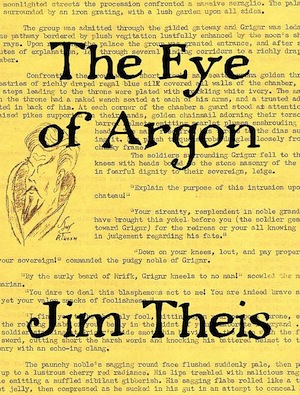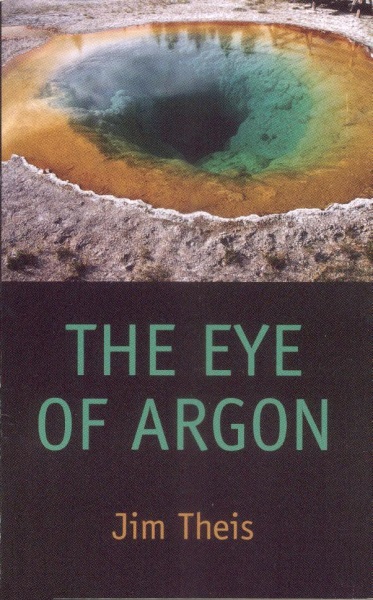


When I attended Clarion in Seattle, they called it a six-week bootcamp for writers. Inevitably, tensions rose as people lacked sleep trying to write and critique stories by talented if new writers. The writing workshop provided multiple ways to distract and amuse you--toys, stuffed animals, books, magazines, illustrations. We had a slush pile to read. There were also stories in photocopied manuscripts that never saw light--such as William Gibson's script for an Alien sequel. (Reminder: this is his failed manuscript, not made into a movie, but decades later is written as an audio play with a novelization by Pat Cadigan.)
One manuscript they kept, was called The Eye of Argon--famously bad. The author's name was unattached. There were rumors that one anonymous person had written it (or some famous writer's early hack work?) while some said that multiple Clarion writers and their teachers like Samuel Delany tried to write the worst story possible. Someone invented game rules for reading the manuscript at conventions.
At the behest of writer friends I read the opening paragraph. I didn't laugh--perhaps smiled to humor the writers--since as an editor I'd seen a lot of bad manuscripts and I'd tried to encourage them all as gently as possible. I didn't have the time to read it, so I put away the manuscript.
If there were a point to having the manuscript float among writers, it would have been to say:
- Take a break. Laugh. Relax.
- Your first drafts may be this bad, so rewrite.
- Don't publish your early drafts or juvenilia.
Later, we all learned the writer of Eye was a sixteen-year-old from
Missouri (I only just learned in the past twenty-four hours), a writer who died two decades ago, now. It was originally printed in a small fanzine that was
passed on to a professional writer. The writer of Eye even wrote a sequel.
Some years ago, people passed around links of the "Star Wars kid"--a kid who jumped around with his light-saber. Remember: In the movies, actors have trainers who help actors practice their moves. This kid's self-training video was posted. The teasing got so bad, the family had to move.
The Eye of Argon had a similar effect on the author. A good sport, he seems to have even taken part in readings--thirty years afterwards--poking fun at his juvenilia, but it haunted him. He apparently became a journalist, so presumably he could write, but this kept him from writing fiction, the past hung like an albatross around his neck.
There's a reason why Samuel Taylor Coleridge's The Rime of the Ancient Mariner has a big impact. Everybody has an albatross. Ulysses S. Grant started his career as a drunk. Abraham Lincoln had depression. The writer, St. Paul, had mysterious "thorn" whatever that was. Evidently, to write this epic poem, Samuel Taylor Coleridge had his own albatross (and/or he knew someone else who had). Either embrace your albatross or shuck it off.
The writer of Eye should have kept writing. He actually has a huge platform.There have been scholarly articles written. Internet postings. A Wikipedia article. Multiple conventions and radio shows devoted to reading it. A few editors appropriated the material and published at least four different editions.
Think about the "Star Wars kid"--he's already got an immediate audience. Whatever he does next, wherever he is, if he announces himself, he's got our immediate attention. (So make it good, kid. The cool kids are rooting for you.)
Besides, what moves people far more than juvenalia? Writers who went on to write something better. Think of it as a home, face, or hair makeover. Who isn't excited to witness a transformation, an upgrade, giving hope for themselves?
Sure, someone would always bring up The Eye, but they are just the people who never shrugged off their albatross and want you to stay in the doldrums with them--someone to feel stronger than, or better looking than, or better at writing. All the cool people would be impressed not only by a success story, but by a well-written tale. The writer of Eye seems to have won a scholarship for his journalism, so he was an award-winning writer! Why not keep this speculative writing up as a sideline and hire a professional to help out?.
Would I want to be the the writer of Eye, would I want his albatross? Hell, no. Nobody wants another man's albatross. They've already got their own. We just want to see you win as we hope to win ourselves one day.
If the writer of Eye were still alive, I'd encourage him to try again. Yes, there's a reason why I wrote "The writer of Eye": because he is all of us.
#
Elsewhere, a writer, weighed down by their own mysterious albatross, adrift in their own doldrums (described as having spiritual aspects) solicited advice to get out. Here are a few possibilities:
- Find the thing that energized you--or used to. Go do that.
- Write. No expectations. Not a particular story unless it jazzes you. Write whatever--essay, poem, story. Let whatever's in you out. But write in the way that empowers you. For me, that is language that pays attention to language. If it's good, great. No expectations.
- Walk or jog outside for 15 minutes/day at least. If you have a god who listens, vent. If you have no god, invent an imaginary friend. Tell him whatever's on your mind.

No comments:
Post a Comment